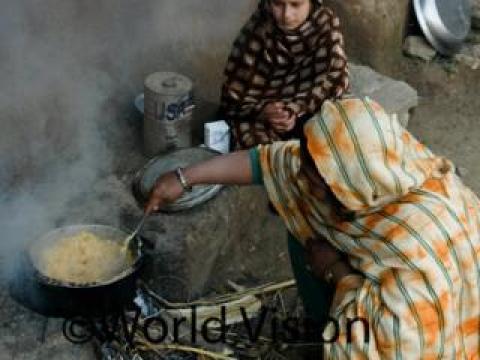Returned but not recovered - mother of six shares why food aid is still desperately needed

Zameena, her husband and children sought refuge with a host family in Rustam, near Mardan. Zameena’s husband took a loan from the host family in order to help support themselves. Shortly after, her husband died in an accident and she was left not only with grief and uncertainty, but a debt to repay.
Her solution?
Zameena ‘sold’ her two daughters in marriage to cover the debt. Shahzad, now 14, was sold for 40,000 rupees (US$473) to a member of the host family in Mardan.
The food aid must go on, I have no other way to support my children Zameena’s younger daughter Kainat, aged 10, was sold in marriage for just 28,000 rupees (US$330) to cover the expenses of her husband’s funeral.
With the money received from the ‘bride price’ of her elder daughter, Zameena purchased a cow upon returning to her village in order to sustain the family.
But she has no inheritance, no house and no access to the land owned by her husband’s family. Zameena and her children now depend on ‘zakat’ or charity by friends and neighbours.
They also rely upon the food aid provided by World Vision and the World Food Programme (WFP). World Vision as an implementing partner of WFP, distributed 12,444 metric tonnes of food rations to 22,644 returning displaced families (122,553 people) from March 2009 to February 2010 in Buner district.
“The food aid must go on, I have no other way to support my children”, says Zameena.
Giving her young daughters in marriage reflects the desperation felt by many families following their displacement.
Some 2.5 million Internally Displaced Persons (IDPs) fled their homes when the Pakistan military carried out operations against Taliban militants in Swat, Dir and Buner.
Monthly food distributions by World Vision have sustained thousands of people - with 123,699 people (22,328 families) receiving food rations in January 2010 alone.
“Women like Zameena are able to collect their food rations on a day specifically allocated to distributions for females, taking into account the cultural norms, values and their need for privacy”, explained Touqeer Ahmed, World Vision Pakistan Commodity Officer in Buner.
“I never thought the distribution would be so easy to access; World Vision staff gave me my rations with dignity and respect”, says Zameena.
For most of the returning families the food rations represent their only meal of the day. On average families like that of Zameena receive 80 kilograms (kg) of wheat flour, nearly 5kg of vegetable oil, 8kg pulses, 1kg salt, 1.5kg of high-energy biscuits, 300 grams of tea and 4kg of sugar on a monthly basis.
With seasonal crops, livestock and seed stores lost due to the conflict, the monthly distributions are still desperately needed. High prices of staples like wheat and pulses compound the already difficult food situation for returning families.
"Please continue the help; we rely on food aid for survival. We will starve or be forced to beg if the food rations are stopped,” says Zameena’s seven-year-old daughter Kausar, with a maturity beyond her age.
The absence of her daughters is also adding salt to a very painful wound.
“I miss them both - especially my younger daughter Kainat who is not treated well by her mother-in-law. She is kept like a domestic servant”, claims Zameena.
“I regret what I did but I had no other choice at that time....it was out of sheer desperation and poverty that I did that. My husband always wanted to give them an education and even took Kainat with him to Karachi to give her an education when he went there to seek work but could not do so unfortunatly”, she explains.
The most vulnerable and dependent families like Zameena’s who have no other means of sustenance desperately need to be supported. Until they are able to establish themselves and have some opportunity to generate an income they will remain dependent on outside assistance.
I regret what I did but I had no other choice at that time....it was out of sheer desperation and poverty that I did that World Vision will devise a mechanism to support them with food items after a series of needs assessments are conducted in the selected Union Councils, however the response will be dependant upon WFP funding.
With the focus shifting from relief to livelihood recovery and development programmes, World Vision will concentrate on three main activities; Food for Work, School Feeding and Mother and Child Health, targeting 10,000 families or approximately 70,000 people residing in 14 out of 27 Union Councils of Buner. To this end World Vision is planning to collaborate with WFP as the donor agency and World Vision being the direct implementing partner.
In addition, World Vision will continue its ongoing interventions around Water and Sanitation, Food Security, Education, and Early Recovery programmes, with advocacy as a cross cutting theme.
Activities include providing tube wells, safe drinking water to the affected population, ensuring adequate sanitation and hygiene; addressing nutritional needs of vulnerable families; providing psychosocial support to affected children through teachers/parent training and establishing Child Friendly Spaces.
-Ends-